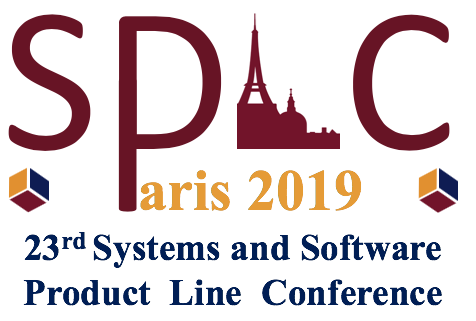We are currently in Phase 2 of the challenge track, and the Call for Solutions is open. The following cases have been selected as representative and timely research challenges in the area of software and system product line engineering.
The new accepted challenges are:
Applying Product Line Engineering Concepts to Deep Neural Networks
Javad Ghofrani, Ehsan Kozegar, Anna Lena Fehlhaber, and Mohammad Divband Soorati
Product Sampling for Product Lines: The Scalability Challenge
Tobias Pett, Thomas Thüm, Tobias Runge, Sebastian Krieter, Malte Lochau, and Ina Schaefer
Please note that the call for solutions also includes the accepted challenges of previous years (i.e., SPLC 2018):
Apo-Games – A Case Study for Reverse Engineering Variability from Cloned Java Variants
Jacob Krüger, Wolfram Fenske, Thomas Thüm, Dirk Aporius, Gunter Saake, and Thomas Leich
Feature Location Benchmark with ArgoUML SPL
Jabier Martinez, Nicolas Ordoñez, Xhevahire Tërnava, Tewfik Ziadi, Jairo Aponte, Eduardo Figueiredo, and Marco Tulio Valente
Interoperability of Software Product Line Variants
Ferruccio Damiani, Reiner Hähnle, Eduard Kamburjan, and Michael Lienhardt
Localizing Configurations in Highly-Configurable Systems
Paul Gazzillo, Ugur Koc, Thanhvu Nguyen, and Shiyi Wei
Check the complete information of SPLC 2019 and SPLC 2018 challenges at:
https://variability-challenges.github.io
Each of these cases presents a set of concrete tasks (some of which may be optional) which are to be solved by the participants. The case descriptions, which typically include pointers to additional resources, are available through the respective links above.
The SPLC 2019 Challenge Track now seeks your solutions to all of these interesting problems of various natures. To participate, select a case you are interested in and submit a paper that tackles the tasks and challenges described in that challenge case. You are welcome to submit multiple papers, where each paper is related to one case. Papers should be accompanied by solution artifacts as necessary, depending on the case study and the concrete tasks which are to be solved. Thus, solution artifacts may range from hand-crafted sketches or models to fully automatically generated development artifacts or analysis results. Wherever possible, solution artifacts should be made available in a public repository or be hosted on a publicly available website to ensure reproducibility of the results. The paper should include a description of your solution and include an evaluation according to the evaluation criteria stated by the respective case description. Note that early ideas, early results, and partial solutions are welcome. Also, note that submissions that apply existing tools and techniques to address a given challenge are also welcome.
Solutions will be evaluated by program committees, one separate committee per case, which are comprised of reviewers who have the expertise required to evaluate submitted solutions. Typically, one or two case authors are part of a case’s PC. Accepted solutions will be presented and discussed at the conference and their corresponding papers will be published in the official conference proceedings. Please note that case authors cannot submit a solution to their own case study in the same year that they present the case. For example, case authors of this edition of SPLC willing to provide solutions to their challenge, can only submit to their own cases in the subsequent SPLC editions, but case authors of the previous SPLC edition can submit solutions to their own challenges.
SUBMISSION INFORMATION
If you have a solution for a challenge of SPLC 2019 or SPLC 2018, you should submit it through EasyChair (Challenge Solutions).
Solutions have a maximum of 4 pages including all text, figures etc. One additional page containing only references may be included. Accepted papers will be presented during the conference. At least one author of each accepted solution must register to the conference.
Submissions must follow the 2017 ACM Master Article Template: https://www.acm.org/publications/proceedings-template.
Latex users are indicated to use the “sigconf” option, so they are recommended to use the template that can be found in “sample-sigconf.tex”. In this way, the following latex code can be placed at the start of the latex document:
\documentclass[sigconf]{acmart}
\acmConference[SPLC'19]{23rd International Systems and Software Product Line Conference}{9--13 September, 2019}{Paris, France}
IMPORTANT DATES (AOE TIME)
The following describes the important dates for the whole timeline of the challenge track.
- Call for solutions released: 18 February 2019
- Solution submission deadline: 4 June 2019 (Extended)
- Challenge solution notification: 18 June 2019
- Camera ready solution papers due: 2 July 2019
PROGRAM COMMITTEE
- Anas Shatnawi, LIP6, Sorbonne University, France
- Jacob Krüger, University of Magdeburg, Germany
- Jaime Font, University of San Jorge, Spain
- Lukas Linsbauer, Johannes Kepler University Linz, Austria
- Malte Lochau, TU Darmstadt, Germany
- Roberto Lopez-Herrejon, Ecole de Technologie Superieure, Montreal, Canada
- Thomas Thüm, TU Braunschweig, Germany
- Tobias Pett, TU Braunschweig, Germany
- Wesley K. G. Assunção, Federal University of Technology, Paraná, Brazil


